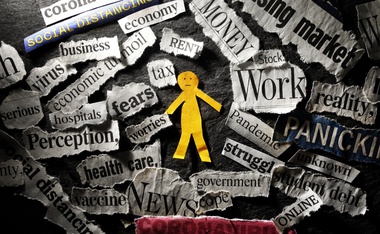The views expressed in our content reflect individual perspectives and do not represent the authoritative views of the Baha'i Faith.
Hi. My name is David, and I’m a news addict. I subscribe to and read three different newspapers each morning, and watch or listen to at least an hour of good quality TV and radio news shows daily.
Yes, it does sound like an addiction, and if so, I’ll admit that I’m pretty hopeless – it’s become a lifelong habit. I can’t help it. In fact, despite the drumbeat of negative news, I actually have learned to enjoy it.
I inhale that much news not only to keep myself informed, and because I have worked as a journalist myself, but mainly due to the advice of the prophet and founder of my Faith, Baha’u’llah, who asked everyone to: “Be anxiously concerned with the needs of the age ye live in, and center your deliberations on its exigencies and requirements.”
Am I “anxiously concerned with the needs of the age”? You bet. Maybe overly so, I’ll gladly stipulate. But I do wish, as a voracious consumer of news about the world, and as a recovering reporter, that our modern news media would adopt a slightly different focus. Allow me to explain.
RELATED: Fasting from Television News To Refresh My Soul

Fueling the Fires of Anxiety and Fear
I live in California, which has become a climate change, drought-driven tinderbox during the past several years. The state’s annual fire season – which, in its mostly Mediterranean climate, happens during the six- to eight-month period when the heat prevents any rain – makes for dramatic news.
Here’s a short summary of the typical tenor and content of most wildfire news coverage: Fire! Flames! Destruction! The entire state is burning! Run for your lives!
This kind of breathless calamity reporting, although it does have immediate value for those in the actual path of actual wildfires, panders to some of our oldest and most basic fears. As small children, flames haunted our nightmares. Deep in our lizard brainstem, we all know the frightening power of fire.
Our for-profit private media companies and the television news programs they own and run know it, too. They also know this kind of limbic fear produces excellent ratings and higher ad rates and ultimately more profits. That’s one of the reasons we constantly see TV reporters doing their live “stand-ups” in front of towering flames, the scarier the better.
As I write this, dozens of wildfires in California, and all across the Western United States and Canada, have dominated the news for the past several months. We hear constantly about the threat, the outbreak of new fires, and the devastating damage done. Total acres or even square miles burned to a crisp, the news reports tell us. Entire towns consumed by fire, residents forced to flee. Many people missing, fatalities suspected. This televised disaster drama follows us everywhere, and it adds up to a traumatizing tsunami of terrible, unrelenting reports.
But last night, it rained.
What a beautiful and welcome sound, that hard, loud drumming of life-giving and life-saving water on the roof. It came in the middle of the night, waking me up. Downpour! Hurray! I laid in my bed and listened to it, saying this beautiful prayer of gratitude from Abdu’l-Baha, Baha’u’llah’s son and successor:
O God! We are as plants, and Thy bounty is as the rain; refresh and cause these plants to grow through Thy bestowal. We are Thy servants; free us from the fetters of material existence. We are ignorant; make us wise. We are dead; make us alive. We are material; endow us with spirit. We are deprived; make us the intimates of Thy mysteries. We are needy; enrich and bless us from Thy boundless treasury. O God! Resuscitate us; give us sight; give us hearing; familiarize us with the mysteries of life, so that the secrets of Thy kingdom may become revealed to us in this world of existence and we may confess Thy oneness.
Newsflash: rain puts out fires. Nature did, in a few hours, what thousands of firefighters couldn’t do in months. Mother nature, you are awesome.
But do we hear about that happy outcome during the following days? Does the news media report the extinguishing of the wildfires as assiduously and sensationalistically as it reported their beginnings? Do we get the piece of mind of knowing how the story ends – or even that it does end? Nope.
That’s one of the strangest characteristics of our media universe – we rarely hear about any disaster actually coming to a close. Have you noticed? Instead, we hear crickets. Successful resolutions don’t make for successful ratings, apparently. Once a calamity occurs, news-wise, it seemingly continues to occur forever. Instead of reporting the end of things, news shows ignore fortunate conclusions and move on to the next over-hyped tragedy: Torrential downpour! Mudslides! Floods! Run for your lives!
RELATED: Overwhelmed By the News? How to Stay Responsibly Informed

As time marches on, this relentless sense of impending news-doom does damage to our psyches and spirits, holding us all hostage to a prevailing perception of high-tension fearfulness. In the artificial reality reported by many news outlets, wars never end, famine always gets worse, pandemics persist permanently. On TV and the web, disasters rarely resolve – they’re just replaced by new ones. Meanwhile, staying informed means your perception of the world’s negative aspects mounts, right along with your stress levels.
All this promotes a public presumption of endless havoc, which actually produces one of the major symptoms of PTSD – hypervigilance. With the populace constantly immersed in a state of heightened fear of impending catastrophe, that perception puts its victims in a near-continuous panic or depression, affecting our society’s ability to function independently, appropriately, and effectively. Which means, of course, that it makes people want to consume more news, like a junkie who needs another fix.
A Modest Media Proposal
So here, in all modesty, I’d like to suggest a simple proposal – how about including a brief segment, in each newspaper and on each TV and radio news show and in the major social media outlets each day, about the actual resolution of catastrophic events? It wouldn’t take much: “18 of the 22 major fires in California were extinguished by heavy rainfall last night. Officials thanked God. People in the affected areas can return to their homes.”
This kind of short disaster summation could accomplish something significant. It would give us all a sense of completion and closure, but more importantly, it would remove the constant nagging anxiety that we now live in continual crisis mode. Our trauma triggers could take a refreshing therapeutic siesta, at least until the next news cycle.
This kind of succinct wrap-up reportage on the conclusion and resolution of disastrous events might even represent one small step toward Baha’u’llah’s rational recommendations for a responsible and credible news media, which he wrote in a tablet in the 19th century:
The pages of swiftly-appearing newspapers are indeed the mirror of the world. They reflect the deeds and the pursuits of divers peoples and kindreds. They both reflect them and make them known. They are a mirror endowed with hearing, sight and speech. This is an amazing and potent phenomenon. However, it behoveth the writers thereof to be purged from the promptings of evil passions and desires and to be attired with the raiment of justice and equity. They should enquire into situations as much as possible and ascertain the facts, then set them down in writing.
Re-establishing the “raiment of justice and equity” Baha’u’llah referred to would do a great deal, not only to responsibly report reality to the public, but to raise the reputation of all reporters – and uphold the truth. In an era when many people have lost their trust in journalism, and have even attempted to depart from the fact-based universe, we need to re-establish the enormous importance of telling that truth.

















Comments
Sign in or create an account
Continue with Googleor